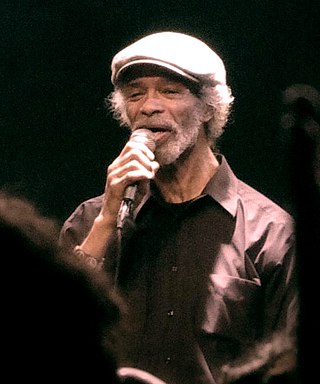
Gilbert Scott-Heron was an American jazz poet, singer, musician, and author known for his work as a spoken-word performer in the 1970s and 1980s. His collaborative efforts with musician Brian Jackson fused jazz, blues, and soul with lyrics relative to social and political issues of the time, delivered in both rapping and melismatic vocal styles. He referred to himself as a "bluesologist", his own term for "a scientist who is concerned with the origin of the blues". His poem "The Revolution Will Not Be Televised", delivered over a jazz-soul beat, is considered a major influence on hip hop music.
"The Revolution Will Not Be Televised" is a satirical poem and Black Liberation song by Gil Scott-Heron. Scott-Heron first recorded it for his 1970 album Small Talk at 125th and Lenox, on which he recited the lyrics, accompanied by congas and bongo drums. A re-recorded version, with a full band, was the B-side to Scott-Heron's first single, "Home Is Where the Hatred Is", from his album Pieces of a Man (1971), featuring a distinctive bass-line by jazz bassist Ron Carter. It was also included on his compilation album, The Revolution Will Not Be Televised (1974). All these releases were issued on the Flying Dutchman Productions record label.
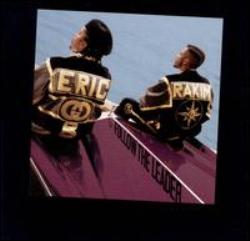
Follow the Leader is the second studio album by American hip hop duo Eric B. & Rakim, released on July 26, 1988. Following their debut album, Paid in Full (1987), Eric B. & Rakim left 4th & B'way Records and signed with Uni Records, a subsidiary label of major label MCA Records. They recorded Follow the Leader at Power Play Studios in New York City. The duo produced, composed, and arranged the album with additional contributions from Rakim's brother Stevie Blass Griffin, who contributed with various instruments. Eric B. & Rakim worked with audio engineers Carlton Batts and Patrick Adams on the album. In a similar manner to their first album, a "ghost producer" was brought in for two songs. In a 2007 interview with Unkut.com, The 45 King said he produced both "Microphone Fiend" and "The R". "Microphone Fiend" was originally made for Fab 5 Freddy, until 45 King gave it over to Eric B., the group's "DJ".
Amos Leon Thomas Jr., known professionally as Leon Thomas, was an American jazz and blues vocalist, born in East St. Louis, Illinois, and known for his bellowing glottal-stop style of free jazz singing in the late 1960s and 1970s.

I Wish My Brother George Was Here is the debut album by American hip hop musician Del the Funky Homosapien. It was released by Elektra Records in 1991. The album was produced by Del, Boogiemen, and Ice Cube. It peaked at number 24 on the Billboard Heatseekers Albums chart, as well as number 48 on the Top R&B/Hip-Hop Albums chart.

Kamaal the Abstract is the third studio album by American hip hop artist Q-Tip, released September 15, 2009, on Battery Records. Recorded in 2001, the album is a departure from his solo debut album Amplified (1999). Kamaal the Abstract is an eclectic album that features Q-Tip rapping, singing, and exploring his jazz influences. The album contains introspective and life-related lyrical themes.

Lonnie Liston Smith Jr. is an American jazz, soul, and funk musician who played with such jazz artists as Pharoah Sanders and Miles Davis before forming Lonnie Liston Smith and the Cosmic Echoes, recording a number of albums widely regarded as classics in the fusion, smooth jazz and acid jazz genres.

Penicillin on Wax is the debut studio album by American New York-based rapper Tim Dog. It was released on November 12, 1991, via Ruffhouse Records. The album was produced by Tim Dog, Ced-Gee, TR Love and Moe Love from Ultramagnetic MC's, Bobby Crawford, and Louis Flores. Kool Keith made uncredited guest appearances on two tracks.

Pieces of a Man is the debut studio album by American poet Gil Scott-Heron. It was recorded in April 1971 at RCA Studios in New York City and released later that year by Flying Dutchman Records. The album followed Scott-Heron's debut live album Small Talk at 125th and Lenox (1970) and departed from that album's spoken-word performance, instead featuring compositions in a more conventional popular song structure.

Winter in America is a studio album by American vocalist Gil Scott-Heron and keyboardist Brian Jackson. It was recorded in September to October 1973 at D&B Sound Studio in Silver Spring, Maryland, and released in May 1974 by Strata-East Records. Scott-Heron and Jackson produced the album in a stripped-down fashion, relying on traditional African and R&B sounds, while Jackson's piano-based arrangements were rooted in jazz and the blues. The subject matter on Winter in America deals with the African-American community and inner city in the 1970s.
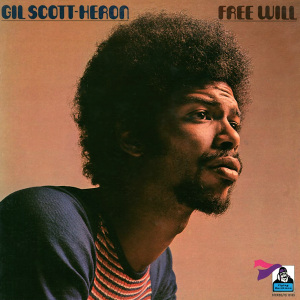
Free Will is the second studio album by American poet Gil Scott-Heron, released in August 1972 on Flying Dutchman Records. Recordings sessions for the album took place on March 2 and 3, 1972, at RCA Studios in New York City, and production was handled by producer Bob Thiele. It is the follow-up to Scott-Heron's critically acclaimed studio debut, Pieces of a Man (1971), and it is the second album to feature him working with keyboardist Brian Jackson. Free Will is also Scott-Heron's final studio album for Flying Dutchman. The album reissued on compact disc in 2001 by Bluebird Records with alternative takes of eight tracks from the original album.
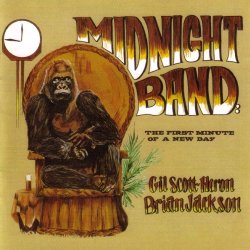
The First Minute of a New Day is an album by American vocalist Gil Scott-Heron, keyboardist Brian Jackson, and the Midnight Band—an eight-piece musical ensemble. It was released in January 1975 on Arista Records. Recording sessions for the album took place in the summer of 1974 at D&B Sound in Silver Spring, Maryland. It was the follow-up to Scott-Heron's and Jackson's critically acclaimed collaboration effort Winter in America. The First Minute of a New Day was the first album to feature "Winter in America", the title track of Scott-Heron's previous album which was not featured on its original LP release. The album was reissued on compact disc by Scott-Heron's label Rumal-Gia Records in 1998.

"The Bottle" is a song by American soul artist Gil Scott-Heron and musician Brian Jackson, released in 1974 on Strata-East Records in the United States. It was later reissued during the mid-1980s on Champagne Records in the United Kingdom. "The Bottle" was written by Scott-Heron and produced by audio engineer Jose Williams, Jackson, and Scott-Heron. The song serves as a social commentary on alcohol abuse, and it features a Caribbean beat and notable flute solo by Jackson, with Scott-Heron playing keyboards.
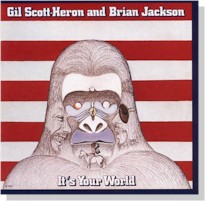
It's Your World is a studio album by American vocalist Gil Scott-Heron and keyboardist Brian Jackson, released in November 1976 by Arista Records. Recording sessions for the album took place in studio and live in July 1976 at Paul's Mall in Boston, Massachusetts, Electric Lady Studios in New York City, and American Star Studios in Merrifield, Virginia. Scott-Heron and Jackson recorded the album with the former's backing ensemble, The Midnight Band. It's Your World was originally released on vinyl and was later re-released in 2000 on compact disc by Scott-Heron's Rumal-Gia label.
Flying Dutchman Records was an American jazz record label, which was owned by music industry executive, producer and songwriter Bob Thiele.

A New Black Poet - Small Talk at 125th and Lenox, also known simply as Small Talk at 125th and Lenox, is a live album and the first release of recording artist Gil Scott-Heron, released in 1970 on Flying Dutchman Records. Recording sessions for the album were originally said to have taken place live at a New York nightclub located on the corner of 125th Street and Lenox Avenue, but liner notes included in the 2012 box set The Revolution Begins: The Flying Dutchman Masters, Scott-Heron himself insists that a small audience was brought to "the studio" and seated on "folding chairs". By the time of the recordings, Scott-Heron had published a volume of poetry and his first novel, The Vulture. Well received by music critics, who found Scott-Heron's material imaginative, Small Talk at 125th and Lenox has been described as "a volcanic upheaval of intellectualism and social critique" by AllMusic editor John Bush.
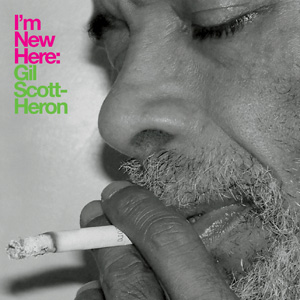
I'm New Here is the 15th and final studio album by American vocalist and pianist Gil Scott-Heron. It was released on February 8, 2010, by XL Recordings and was his first release of original music in 16 years, following a period of personal and legal troubles with drug addiction.

Secrets is a 1978 studio album by American vocalist Gil Scott-Heron and keyboardist Brian Jackson.

1980 is a studio album by American singer-songwriter Gil Scott-Heron and keyboardist Brian Jackson. Their ninth album together, it was recorded from August to October 1979 during a period of creative tension between the two musicians and released in February 1980 by Arista Records.
"Whitey on the Moon" is a spoken-word poem by Gil Scott-Heron, released as the ninth track on his debut album Small Talk at 125th and Lenox in 1970. Accompanied by conga drums, Scott-Heron's narrative tells of medical debt and poverty experienced at the time of the Apollo Moon landings. The poem critiques the resources spent on the space program while Black Americans were experiencing social and economic disparities at home. "Whitey on the Moon" was prominently featured in the 2018 biographical film about Neil Armstrong, First Man, and the second episode of HBO's television series Lovecraft Country. It received renewed interest in 2021 following spaceflights by billionaires Jeff Bezos and Richard Branson, which were seen as emblematic of the inequities highlighted by the poem.

















